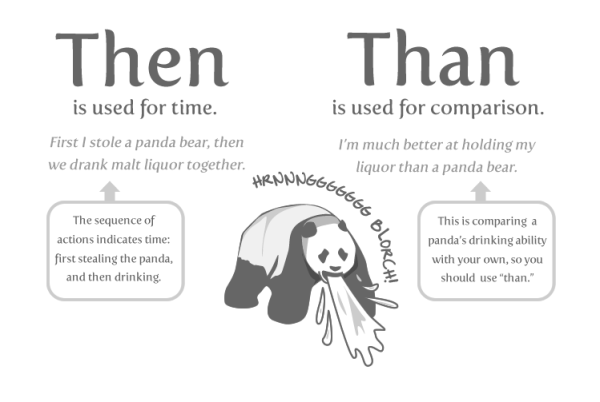
Another set of tricky words that people often confuse are ‘then’ and ‘than’. ‘Then/than’ get confused primarily because their pronunciations are similar and many people may not even know that ‘than’ and ‘then’ have different meanings. Many people think they are one word just being pronounced differently. I am here to clear the air on ‘than’ and ‘then’. Where should we start?
The most important difference between ‘than’ and ‘then’ is that one is an adverb (then) and one is a conjunction (than). ‘Than’ is a comparison word. It compares two nouns. One noun is bigger/smaller/funnier/smarter/cooler than the following noun. ‘Then’, on the other hand, shows time. It is used to show the sequence of events (I went to school, then work, then home) or time (Back then, I was much more beautiful).
Examples
1) My breakfast is better than your breakfast
2) My breakfast is better then your breakfast
In the above example there is no mention of time. Although you eat breakfast in the morning, the sentence bears no context in time. The sentence does compare two nouns. My breakfast is being compared to your breakfast, and mine is clearly more delicious. The use of comparison shows us that the proper word to use is ‘than’ and sentence 1 is correct.
Example:
1) Only than can you go outside and play
2) Only then can you go outside and play
In the above example there is a very obvious mention in time. ‘Only then’ translates to ‘only at that time’ in this sentence. There is no comparison between nouns. Outside and play are not being compared. The proper word choice for this sentence is therefore ‘then’ and sentence 2 is correct.
Then can also be used to mean ‘therefore’ or ‘in addition’ but always remember that it presents the idea of time in the sentence. I hope that reading this post has made you more aware of ‘then/than’ than you were before you read it!
One again, theoatmeal.com has a very useful image:

Leave a comment